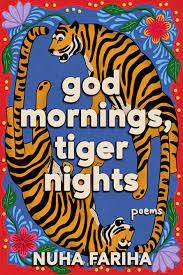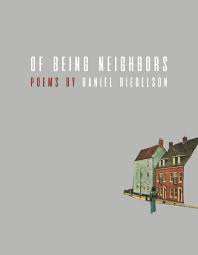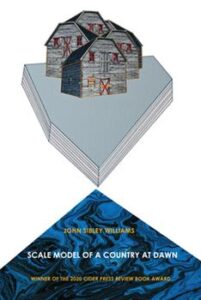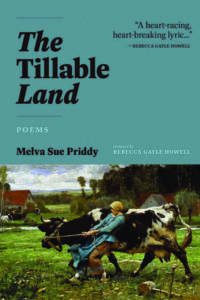Reviewed by Shlagha Borah | December 7, 2023
Game Over Books, 2023
Paperback, $18
“I traveled light like all daughters, carrying only my weight out of the world.”
from “A Brief Travel Advisory” by Nuha Fariha
Girlhood, nationhood, and an identity smeared across borders – Nuha Fariha’s collection of poems, god mornings, tiger nights, asks us to interrogate how much of a woman is her country, how much of her home is her body. She asks, over and over again, who protects the marginalized, who ensures girls don’t grow into the ghosts of their mothers and grandmothers.
This brilliant and radical collection deals with themes of immigration, citizenship, belonging, gender, home, and displacement. As a first-generation Bangladeshi-American immigrant, the speaker in her poems enquires, how does one know where one belongs? In “New Citizenship Test,” she writes, “What protects Voting Rights in the United States?/ Nothing.”
The collection begins with the poem, “In Which I See the Tigers in the Cage and Cry” where the speaker looks us in the eye and lays her truth bare. “Tiger as myth,” “Tiger as homeland,” “Tiger as allegories” – the central image of the Royal Bengal Tiger at the heart of this collection, a symbol of national pride, makes the reader question the concepts of lineage, heritage, traditions, and who determines them. Outlining the idea of myths and oral histories, Fariha interrogates what is real, what is imagined, and the bridges that separate them. In “A Theory of Tigers”, she declares, “Tigers are constructed,” demanding us to reconstruct our worldview, and language as we know it. She titles one of her poems, “In The Beginning There is Nothing,” but this collection is proof that Fariha is taking us back to the beginning; an active attempt at rewriting myths that glorify acts of violence. Again, in “Mother Returns as Tiger,” she anthropomorphises the symbol of the tiger into something beaten and worn, who returns as fierce and unafraid.
One of the things that stood out the most to me in this collection is the deep attention to language and playfulness of form. The tensions between these felt like an intentional approach toward decolonizing our ideas of traditional forms. Through these divergences, she establishes a commentary on the idea of the American dream. In “In the Sweat of Cleaning: A List of Things I Know Are True,” the speaker exclaims, “Zealot is another way to say ‘AMERICA.’”
The fragments and caesurae present throughout the collection elevate the narrative voice and transport us to the present world of the poems. The sonic richness and sensory details – descriptions of food, Bengali music, and dialogues between speakers – sharpen the urgency of the momentum in these poems. She not only experiments with white space, footnotes, lineation, and imagines the page as a landscape and ground for infinite possibility, but in doing so, complicates the linearity of events and memories, which feels deliberate and fitting for a collection that draws upon themes of violence and grief. Contrary to the intimate details of personal and familial history in most of the poems, she employs a bureaucratic tone, distant and devoid of emotion in “Anthem for a Young Girl with a Positive PPD Test.” As a South Asian immigrant writer in the United States, this poem hit home, and it reminded me of the humiliation of the mandatory tuberculosis test for immigrants as a protective measure.
To this particular reader, food is not just a celebration of grease and warmth – Nihari, aubergines, samosas, and more – it is the connective tissue of this collection. It’s the arc through which we express our reverence for our lineage, our communities, and honour the immigrant experience. It’s a clear metaphor for the way capitalistic versus communal societies operate, how food has the ability to both unite and create differences between groups of people. Fariha’s work is in conversation with Tarfia Faizullah, Warsan Shire, and Sarah Gambito – female poets of colour whose poetry is bound by the aching sense of identity, embodied memory, and relationship to God & faith. Who do we turn to when systems fail us over and over again? In “Documented Alien”, she writes:
During show and tell
I stand up proudly.
I am an alien,
I tell the class.
I am an alien.
Fariha writes with generosity and empathy for the generations of women in her family who mirror one another’s trauma. The poems here reclaim spaces that rightfully belong to the speaker, holding space for her to heal from intergenerational trauma and encouraging the reader to break cycles of violence. The undercurrents of rage coupled with the tones of loneliness and yearning make this a stellar debut.
Immigrant daughters often reach out towards one another, be it in their rituals of making chai, parathas or poems. Fariha is not an exception. In “Reader, I Married Him,” she asks the reader to collaborate with her to create an experience that exists beyond the written page. As the collection progresses, the poetic voice sounds more and more assertive, when she names the ghosts of the women wronged by systems of oppression.
In “Hunger,” she writes, “All my sisters are hungry today. We are ready to feast.” The plural first person “we” felt to me, like a call to action, and transported me back to summer vacations in my grandmother’s house in a small village in India. My aunts and cousins dipping Marigold biscuits into our teacups, catching up on the neighbourhood gossip, dicing vegetables for dinner. Women sitting together, laughing.
ABOUT THE AUTHOR
Nuha Fariha is a first generation queer Bangladeshi writer. Her work has appeared in RoadRunner Review, MAGMA, Thin Air, and elsewhere. Her writing has been supported by Anaphora Arts, Key West Literary Seminar, Juniper Summer Writing Institute and Mountain Words Literary Festival. She is currently earning her MFA in Creative Writing at Louisiana State University. This is her first book. You can learn more about her at nuhawrites.com.
ABOUT THE REVIEWER
Shlagha Borah (she/her) is a multi-genre writer from Assam, India. Her work appears or is forthcoming in Salamander, Nashville Review, Identity Theory, Longleaf Review, Variant Literature, South Dakota Review, and elsewhere. She is a 2nd year poet in the MFA program at the University of Tennessee, Knoxville, and is an Associate Poetry Editor at Grist. Her work has received support from Brooklyn Poets and Sundress Academy for the Arts. She is the co-founder of Pink Freud, a student-led collective working towards making mental health accessible in India.





